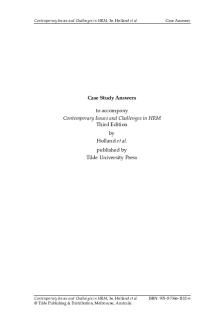Issues Faced by Beginners PDF

| Title | Issues Faced by Beginners |
|---|---|
| Course | Psychology Of Counseling |
| Institution | Texas Christian University |
| Pages | 2 |
| File Size | 35.5 KB |
| File Type | |
| Total Downloads | 77 |
| Total Views | 179 |
Summary
Dr. Joy McInvale...
Description
Ashlyn Holliday Dr. Joy McInvale Psychology of Counseling August 30, 2017 Issues Faced by Beginning Therapists 1. Dealing with your anxieties a. During your first year or so of work, there will be anxiety 2. Being yourself and self-disclosure a. Freud talked about transference and counter-transference b. Know how much to share about yourself c. Good boundaries d. In the beginning, you’ll do too little or too much i. If clients want to be friends, that’s too much 3. Avoid perfectionism a. Be realistic with expectations of yourself 4. Be honest about your limitations a. If you don’t know the answer, that’s okay i. Do research and let them know later on ii. Have them do research and discuss the findings of both 5. Understand the importance of silence a. Silence is different than the silent treatment 6. Dealing with the demands of clients a. Not necessarily needy people, just have demanding needs b. Seen a lot in borderline personality disorder 7. Dealing with clients who lack commitments a. Tell clients upfront that you will work hard, but not harder than the client will work b. Be caring and gentle c. “Every counselor needs a counselor” 8. Tolerating ambiguity- is the client getting worse or better? a. Clients might say it’s not helping, which is fine, just revaluate b. It’s okay to ask the client how they feel therapy is going 9. Be aware of your own counter-transference a. We can identify with someone to the point that we lose objectivity 10. Have a sense of humor a. You’ll feel guilty about being light hearted, but they might need that 11. Sharing responsibility with the client is hard to learn to do a. You can be clear with yourself and your clients b. Find a balance of how to share responsibility and communicate 12. Declining to give advice a. Decide early in career if you’re in it for the relationship or the treatment b. Important to make sure it can really apply to the problem being described i. It could possibly harm them
13. Defining your role a. Be aware of your strengths and weaknesses 14. Learn to use techniques that work for the program a. Practice on others before doing it with a client b. Don’t do a technique meant to last for 2 hours in a 1 hour session 15. Develop your own style a. What is your personal theory of counseling? b. Should be based on research and evidence 16. Maintaining your vitality as a person and a professional a. This is hard, but essential b. Become a balanced person c. Career is not the most defining part of you...
Similar Free PDFs

Issues Faced by Beginners
- 2 Pages

Beginners Guide NL - Rugby
- 16 Pages

Ansys Tutorial for beginners
- 16 Pages

Contemporary Issues
- 18 Pages
Popular Institutions
- Tinajero National High School - Annex
- Politeknik Caltex Riau
- Yokohama City University
- SGT University
- University of Al-Qadisiyah
- Divine Word College of Vigan
- Techniek College Rotterdam
- Universidade de Santiago
- Universiti Teknologi MARA Cawangan Johor Kampus Pasir Gudang
- Poltekkes Kemenkes Yogyakarta
- Baguio City National High School
- Colegio san marcos
- preparatoria uno
- Centro de Bachillerato Tecnológico Industrial y de Servicios No. 107
- Dalian Maritime University
- Quang Trung Secondary School
- Colegio Tecnológico en Informática
- Corporación Regional de Educación Superior
- Grupo CEDVA
- Dar Al Uloom University
- Centro de Estudios Preuniversitarios de la Universidad Nacional de Ingeniería
- 上智大学
- Aakash International School, Nuna Majara
- San Felipe Neri Catholic School
- Kang Chiao International School - New Taipei City
- Misamis Occidental National High School
- Institución Educativa Escuela Normal Juan Ladrilleros
- Kolehiyo ng Pantukan
- Batanes State College
- Instituto Continental
- Sekolah Menengah Kejuruan Kesehatan Kaltara (Tarakan)
- Colegio de La Inmaculada Concepcion - Cebu











